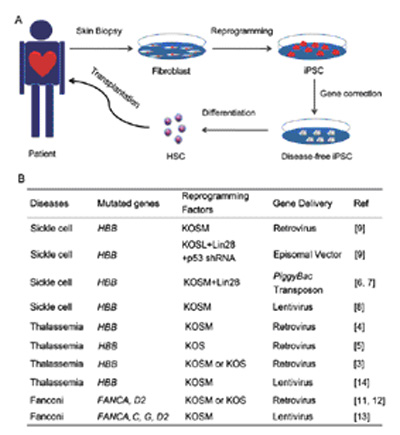Reprogramming based gene therapy for inherited red blood cell disorders
Red blood cells (RBCs) are the most abundant cells in human beings. Dysfunction of RBCs very often leads to anemia.
Currently, Hematopoietic stem cell transplantation provides the curative therapy for the inheritable red blood cell disorders. Due to the difficulties including in finding matched donors, in vitro expansion of HSC, and safety concerns caused by gene delivery, induced pluripotent stem cells (iPSCs) provide a new promising strategy for cell therapy of RBC diseases. Capable of unlimited proliferation and gene editing for correction of disease mutations, the iPSCs from anemia patient may constitute, in the near future, a valid alternative to HSCs for the treatment of anemic patients.
A review paper published in Cell Research (2012,Jun;22(6):941-4) by Dr LIU Guanghui’s group focuses on the recent progress in the application of induced pluripotent for the cure of severe genetic RBC diseases. In this review, the reprogramming factors, gene delivery vectors, gene correction and functional assays have been summarized and discussed regarding to the progress and obstacles in Thalassemia, Sickle cell disease and Fanconi anemia.

Fig. (A) iPSC-based cell therapy for inheritable RBC disorders. Patient fibroblasts can be obtained from skin biopsy or other tissues, followed by reprogramming with distinct set of factors to establish patient-specific iPSCs. These iPSCs bearing genetic mutations will be corrected with gene editing approaches to produce disease-free iPSCs. The corrected iPSCs are autologous and able to be differentiated into hematopoietic stem cells in vitro for therapeutic purposes. (B) Summary of iPSC from anemic patients. K, KLF4; O, OCT4; S, SOX2; L, L-MYC; M, c-MYC. (by Dr Guanghui Liu et al .)
Dr LIU Guanghui’s group, in the Institute of Biophysics, Chinese Academy of Sciences, has established a well-defined system for modeling the human disease with patient-specific iPSC, in situ genomic gene editing and direct differentiation technologies. Their ultimate goal is to obtain the autologous disease free hematopoietic stem cells/progenitor cells for the therapeutic purpose. This work was supported by Strategic Priority Research Program of the Chinese Academy of Sciences, and National Natural Science Foundation of China. Drs. Xiuling Xu and Jing Qu are co-first authors in this paper.
The link to this article: http://www.nature.com/cr/journal/v22/n6/full/cr201254a.html
Xu X1, Qu J1, Suzuki K, Li M, Zhang W, Liu GH*, Belmonte JC*. Reprogramming based gene therapy for inherited red blood cell disorders. Cell Res. 2012; 22(6):941-4. (*Corresponding author)

